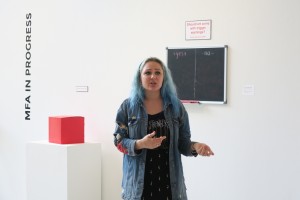
A red step-stool stands bright against a tall, white pedestal, beckoning one to peer down at what’s inside the walled-off top. A note affixed to the pedestal warns the viewer that the images on display may cause emotional or mental distress.
Graduate student Chelsey Webber-Brandis is asking the question, “Should art come with a trigger warning?” She’s been studying the effects of trauma and grief for the last year and a half, and presented a wellness skills workshop called “Balanc(ed)” November 20 in The Galleries at Moore.
Webber-Brandis' workshop contains "research and a miniworkshop on self-care for artists, especially those working through trauma and who may be representing it in their art,” she said, along with Kristin Shahverdian MA ’19. The workshop is the culmination of a guest lecture series that Webber-Brandis and Shahverdian did called “Trigger(ed): Ethics of Witnessing.” For that series, they went into undergraduate classrooms at Moore to discuss trauma in the arts and the ethics of making and viewing such work.
A MOORE WELCOME
Webber-Brandis moved to Pennsylvania from southern California with her partner about four years ago, and had just applied to Moore’s graduate program when her partner died in January 2018.
“I had to decide, do I go ahead and start this program? Do I stay here on the East Coast where I don’t know many people? Do I go home?” she wondered. “I decided to take a leap and continue the program.”
She was scared, but she said it felt like the right thing to do.
“I think it provided me with a structure and a place for me to process what I was going through,” Webber-Brandis said. “A lot of my work is extremely personal and vulnerable. It’s work about death and grief and loss, or it’s about trauma and violence and things like that.”
TRANSITION
One of her first pieces was a large work she called Ars Moriendi (Death Bed), made of wood, chicken wire, burlap and locally gathered branches and leaves in various phases of decomposition. It was a memorial to her late fiancé, Erin Morrow.
“I was interested in not only death, but how death can be a rebirth on some level at the same time,” she said. “I no longer have my partner, but I do have this new life that is changing, but it’s a new start at the same time.”
Another project involved casting ashes from burned wood in alginate. She made a cast of her hands wearing her and her fiance’s engagement rings, and filled it with wood ashes. The ashes are brittle and difficult to work with.
“There’s this tension between wanting to hold onto something that really was not wanting to be held onto,” she said. “And that is exactly what grief is. You try to hold onto something that can’t be held onto anymore.”
TRIGGER WARNINGS
Weber-Brandis’s MFA in Progress exhibition in spring 2019, featuring the pedestal and red step stool, seemed to depart from the art she made to address process of grieving.
“But what I found going through the grieving process is that trauma is like a ball of thread or a knot of jewelry and you are trying to untangle it and you loosen up one section of it,” she said. She is a survivor of childhood abuse and trauma, and she said it took many years to figure out that she was experiencing symptoms of post-traumatic stress disorder. “I realized I was grieving a lot of other past experiences from my childhood and young adult years.”
The images one could see while standing on stool were photos of Webber-Brandis taken after a domestic altercation.
“Like most themes and topics in my work, wellness and care started as personal interests,” she said. “More recently, I came to realize that in order to make work about the intensities of personal and cultural traumas, I needed a set of skills to help me do so in a safe manner.” That’s where her motivation for the “Balanc(ed)” workshop comes from. “My collaborators and I will be teaching a series of skills, such as grounding, meditation, stretching and journaling.”
“Balanc(ed): A Wellness Skills Workshop” was held in the Widener Memorial Foundation Gallery (atrium area) from 11:30 am to 12:30 pm on November 20.
